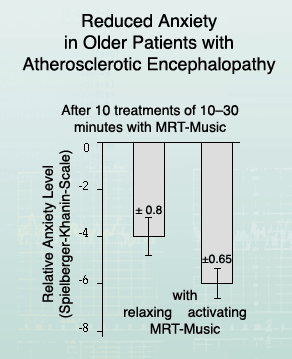The patients were treated with both relaxing and activating Medical Resonance Therapy Music®. There were 10 treatments in total, each treatment lasting from 10 to 30 minutes. Starting with a habituation phase of 10 minutes the treatment was expanded step by step up to 30 minutes. During the first three treatments relaxing MRT-Music® was given, in the following four treatments the patients received activating MRT-Music; during the last three treatments then they received in the first 10 minutes relaxing and in the following 20 minutes activating MRT-Music®.
During the whole time of treatment with Medical Resonance Therapy Music® the patients did not receive any medication effecting the central nervous system.
Results
The anxiety levels were evaluated using the Spielberger-Khanin-Scale, documenting the following effects of the Medical Resonance Therapy Music®: after the relaxing music a reduction of the reactive anxiety by 4 units (±0.8) was registered and after the activating music a reduction by 6 units (±0.65).
Investigators:
Prof. Dr. med. A. Reznikov
Prof. Dr. med. G. Butenko
Dr. med. N. Bachinskaya
Dr. med. S. Litovchenko

